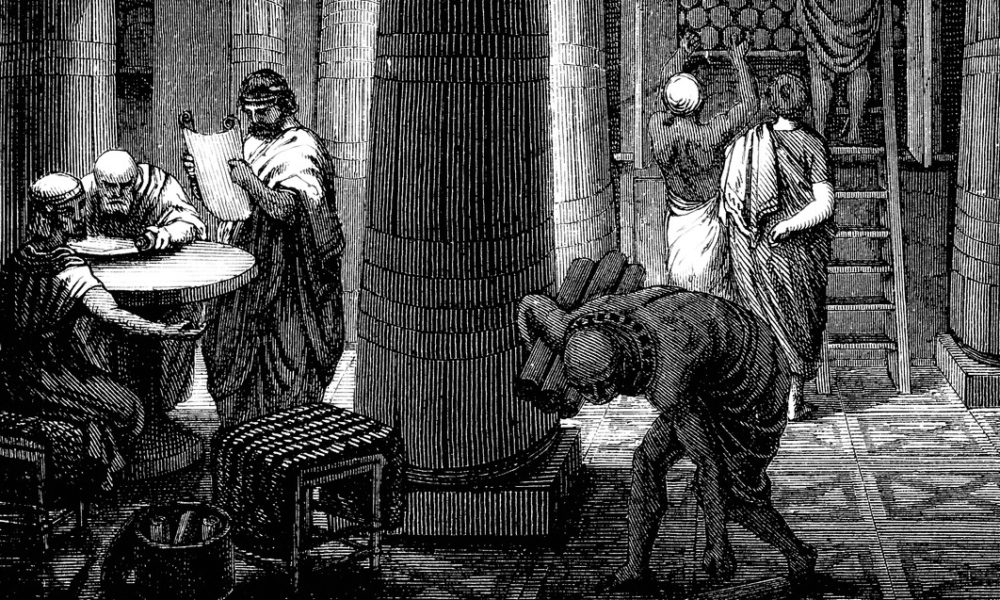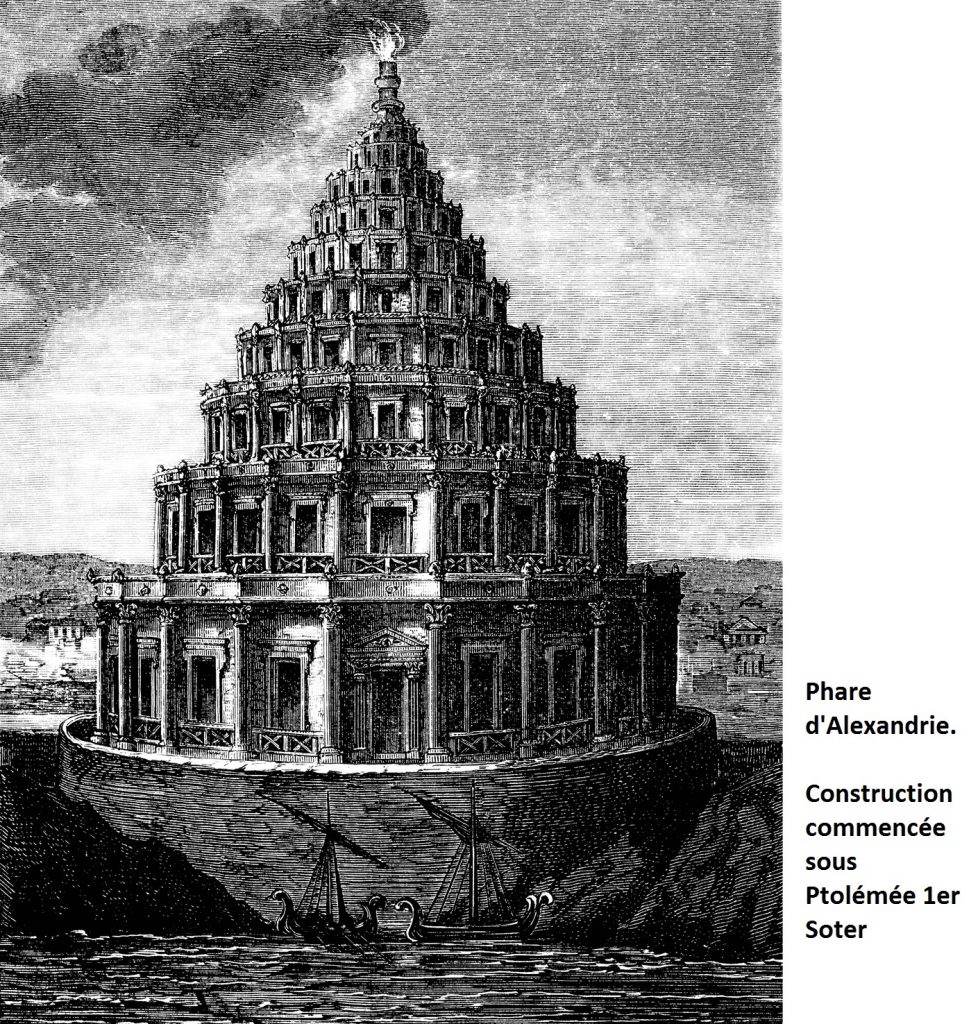
310 BC to 290 BC, Psalm 32: The Lagids.
This site was first built in French (see www.147thgeneration.net). The English translation was mainly done using « google translation ». We have tried to correct the result of this translation to avoid interpretation errors. However, it is likely that there are unsatisfactory translations, do not hesitate to communicate them to us for correction.
(for that click on this paragraph)
Summary
This generation is from the years 310 BC to 290 BC
According to our count, this generation is the 32nd generation associated with Psalm 32. It is in this Psalm 32 that we therefore find an illustration of the facts of this generation.
The death of Alexander the Great in 323 BC did not allow him to consolidate his empire. Its generals share the empire: Ptolemy, Seleucos and Antigonos. Seleucus founds the Seleucid Empire which includes Persia and Mesopotamia. This dynasty will produce in a few generations Antiochus Epiphanius who will cross the destiny of the Jewish people again. Antigonos, despite larger claims, will have to be content with the western part of the empire, mainly Greece.
Ptolemy will inherit mainly from Egypt and thus form the empire of the Lagids, named after his father Lagos. Jerusalem lost its sovereignty, but it was illusory because Jerusalem before the arrival of the Greeks was dependent on the Persians. By falling under the yoke of the Lagids, Jerusalem preserved a certain autonomy and religious freedom.
Talk
The division of the empire
The death of Alexander the Great in 323 BC did not allow him to consolidate his empire. Its generals share the empire: Ptolemy, Seleucos and Antigonos.
Seleucus founds the Seleucid Empire which includes Persia and Mesopotamia. This dynasty will produce in a few generations Antiochus Epiphanius who will cross the destiny of the Jewish people again. The founder of the dynasty, Seleucos I Nicator (358 BC / 281 BC) founded, like Alexander the Great, seventy cities, sixteen of which bear the name of Antioch in memory of his father.
Antigonos, despite larger claims, will have to be content with the western part of the empire, mainly Greece. Ptolemy annexed Jerusalem to his empire in 302 BC
Ptolemy
Ptolemy will inherit mainly from Egypt and thus form the empire of the Lagids, named after his father Lagos.

The formation of the three empires is not spontaneous: before freezing many intrigues and conflicts took place. The consolidation of these empires is done and ends during the generation that interests us.
The meeting of the Jews and the Lagids
This is how Ptolemy annexed Jerusalem to his empire in 302 BC. For this, we can follow the story of Flavius Josephus:
- How[3] Ptolemy The Son Of Lagus Took Jerusalem And Judea By Deceit And Treachery, And Carried Many Thence, And Planted Them In Egypt.
1. Now when Alexander, king of Macedon, had put an end to the dominion of the Persians, and had settled the affairs in Judea after the forementioned manner, he ended his life. And as his government fell among many, Antigonus obtained Asia, Seleucus Babylon; and of the other nations which were there, Lysimachus governed the Hellespont, and Cassander possessed Macedonia; as did Ptolemy the son of Lagus seize upon Egypt. And while these princes ambitiously strove one against another, every one for his own principality, it came to pass that there were continual wars, and those lasting wars too; and the cities were sufferers, and lost a great many of their inhabitants in these times of distress, insomuch that all Syria, by the means of Ptolemy the son of Lagus, underwent the reverse of that denomination of Savior, which he then had. He also seized upon Jerusalem, and for that end made use of deceit and treachery; for as he came into the city on a sabbath day, as if he would offer sacrifices (1) he, without any trouble, gained the city, while the Jews did not oppose him, for they did not suspect him to be their enemy; and he gained it thus, because they were free from suspicion of him, and because on that day they were at rest and quietness; and when he had gained it, he ruled over it in a cruel manner.
Jerusalem lost its sovereignty, but it was illusory because Jerusalem before the arrival of the Greeks was dependent on the Persians.
At the birth of the Greek Empire, Jerusalem was unlikely to regain its independence within the great empires that were being built. By falling under the yoke of the Lagids, Jerusalem preserved a certain autonomy and religious freedom:
- A Jew [1] who would become a citizen of a Greek city, in the classical sense, would take serious risks, committing himself to share with his new compatriots the political and religious duties inherent in the status of citizen. In Sparta, he should participate, with the other « Similar », in « syssitia », common meals of Lacedaemonian warriors, not very kosher; in Athens, he could not escape the worship of Athena, unsavory to a good Israelite. On the other hand, no danger of this kind watches the Jew who is part of the Hellenic community in Ptolemaic Egypt. He remains Jewish by his religion, while being Greek by his language, his culture, his social condition. If his Greek neighbor venerates Sarapis, the Alexandrian deity par excellence, why should the Jew be prevented from going to the synagogue and praising in his prayers his God to him, invisible and anonymous? He is Ioudaios (Jew), as his neighbor is Athenaios (Athenian) or Makedon (Macedonian). This quality, which affirms its belonging to the Jewish people, guarantees at the same time, in relation to Egypt and the Egyptians, its participation in the minority of Greek-speaking conquerors.
If Flavius Josephus draws a negative assessment of this invasion by the Lagids, it is only in the name of the national identity and not at the religious level:
- Thus [2] being master of the city (Jerusalem), he (Ptolemy I Soter) treated her cruelly. Agatarchides, Cnidian, who wrote the story of Alexander’s successors, reproach to us (the Jews) our superstition on this, saying that it has made us lose our freedom. « A people, » said he, « who bears the name of the Jews, and who lives in a great and strong city called Jerusalem, who did not wish to take up arms by a mad superstition, suffered that Ptolemy should have mastered it, and a rough master. » This prince drew several inhabitants of the mountains of Judea; from the environs of Jerusalem, Samaria and the mountain of Garizim to send them to Egypt. And as the answer he knew that the Jews had made to Alexander after he had conquered Darius had taught him that they very religiously observed their oaths, he entrusted them with the custody of various places. He gave them the right of a middle class in Alexandria, as well as to the Macedonians, and obliged them by oath to be faithful to him and to his posterity. Several other Jews went to settle in Egypt, where they were attracted by the fertility of the country and by the affection which Ptolemy showed to those of their nation.
This last commentary of Flavius Josephus confirms that the meeting of the Jews and Lagide was done in good intelligence even if the latter does not find any argument against the taunts of those who consider that the strict observance of the divine commandments played against the Jews .
In this case, the result is not really detrimental to the Jews, because in addition to not suffering such an unfavorable yoke (the comments on the harshness of the invader are certainly more justified for future generations), the deportations carried out by the Lagids (willingly or by force) are the first real ferment of the Jewish diaspora which will prove to be largely necessary when Israel undergoes in a few centuries the setbacks of the Roman occupation.
It is this ambiguous situation that the psalm describes:

- Of David, a maskil Praiseworthy is he whose transgression is forgiven, whose sin is concealed.
- Praiseworthy is the man to whom the Lord ascribes no iniquity and in whose spirit there is no guile.
- The period of Jewish cohabitation with the Lagids will be generally beneficial, when the Jews will be confronted with the Seleucids, they will once again become a people in their own right even without regaining their independence. God has thus turned the page on the idolatry of the first generations of the night. The Jewish people are once again completely faithful to their God even though strict respect for the divine law (respect for Shabbat) leads them to Lagide rule. But this respect for the law of God without calculation (« no guile ») guarantees the happiness of his people.
- When I was silent, my bones decayed with my moaning all day long.
- For [both] day and night Your hand is heavy upon me; my freshness was transformed as in the droughts of summer, forever.
- I would inform You of my sin, and I did not conceal my iniquity; I said, « I will confess my transgressions to the Lord, » and You forgave the iniquity of my sin forever.
- During the long generations in which the Jewish people had kept away from their God (When I was silent), the sufferings followed each other until God’s people were almost exterminated. The long journey since the return from Babylon has brought the Jewish people back to faithfulness to their God, which has resulted in the forgiveness of ancient faults by this one.
- For this let every pious man pray to You at the time that You are found, only about a flood of vast waters [that] should not reach him.
- You are a shelter for me, from an adversary You guard me; with songs of deliverance You encompass me forever,
- « I will enlighten you and instruct you which way [to go]; I will wink My eye to you. »
- Be not like a horse, like a mule that does not discern; whose mouth must be held with bit and bridle, so that when he is being groomed, he does not come near you.
- Many are the pains of the wicked, but as for him who trusts in the Lord- kindness will encompass him.
- Rejoice with the Lord and exult, You righteous, and cause all those of upright hearts to sing praises.
- In spite of the unflattering result (the Lagide domination without combat) that the Jewish people garner for their fidelity towards God and which entails the jeers of other peoples as Flavius Josephus recalls, it is the Jewish people who will be the final winner. The other peoples will all have their fleeting hours of glory until they themselves are submerged in turn by the apogee of another people. The Jewish people who ignore earthly powers know that God will eventually remember Him while other people will have to pay for their negative actions towards the holy people.

[1] J Mélèze Modrzejewski, The Jews of Egypt from Ramses II to Hadrian, Chapter: The Zenith: The Egypt of the Lagids. (French: « Les Juifs d’Égypte de Ramsès II à Hadrien », Chapitre : Le Zénith : L’Égypte des Lagides) .
[2] Flavius Josephus / Jewish Antiquities / Book Twelfth / Chapter 1.
[3] Flavius Josephus / Jewish Antiquities / Book Twelve / Chapter 1 (beginning)
